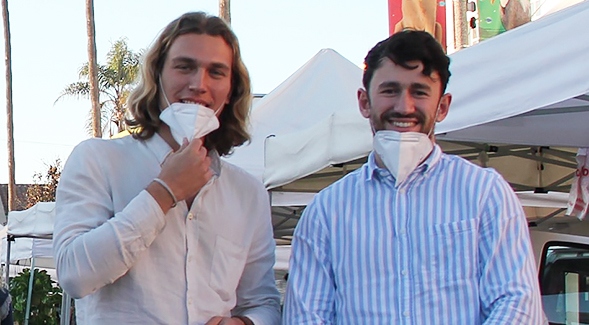International Exchange Students Help Restaurants During COVID-19 Crisis
An idea developed by two international students at SDSU has grown into a company with a mission to prevent food waste.

“Our goal is to help as many local communities as possible and expand further to help prevent food waste and hunger.”
Due to the COVID-19 pandemic and the subsequent lockdown of many businesses throughout the U.S., the nation’s restaurant industry has been particularly hard hit.
As a local remedy to this situation, two international exchange students studying at San Diego State University have devised a mobile app that can help restaurants sell unserved food at closing time while offering customers a substantial discount.
Till Hartwig and Till Kuehn, both students at the Berlin School of Economics and Law in Germany, came to SDSU during fall 2019 to study management and entrepreneurship for one semester. During the semester, they were encouraged by SDSU management lecturer Tanya Hertz to discuss two start-up ideas they had during an elevator pitch contest staged by SDSU’s ZIP Launchpad.
One of those ideas was for a phone app allowing restaurants to sell the food that was left at the end of the night and would normally be thrown away. The leftover food would be available for takeout to customers at deep discounts while allowing restaurants to recover some of their costs, while the company till gets a small fee from every transaction.
“The idea won the competition,” said Hartwig. “The ZIP Launchpad staff encouraged us to join the program and we did. We were the first international exchange student team to be a part of this outstanding startup incubator.”
However, as exchange students, Hartwig and Kuehn had to overcome a major hurdle.
“Since we only had one semester, we had to work very hard to show quick progress,” said Kuehn. “When it came time for us to go home, we realized we had invested a lot of energy in the project and the longer we worked on it the more certain we felt that we could make this a real company that could help the community.”
When the two realized that they would not be able to attend SDSU as exchange students for another semester, they decided to enroll at SDSU as international students and pay the full tuition costs in order to continue working on their startup idea during the spring 2020 semester.
“Then COVID-19 hit,” said Hartwig. “That’s when things really got complicated. Till Kuehn had to fly home to Germany for a while, and even though I was still here, it was hard to keep everyone motivated at first.”
In a stroke of luck, the two found a lifeline through the Optional Practical Training program offered through the U.S. Department of Homeland Security. The program allowed Hartwig and Kuehn to remain in the U.S. as temporary employees of their own company as they continue their studies with an internship at a local startup incubator REC Innovation Lab. This gave them the leeway to continue working to launch the till App even in the face of the pandemic shutdown.
Kuehn and Hartwig are still determined to see the project through to completion and with the help of three other partners and two student interns (funded through the ZIP Launchpad’s Aztec Cooperative Fund) they are well on their way. With some additional funding through the Lavin Early Seed Startup Fund and the Zahn Success Fund Award the two were able to launch the till App on Jan. 29.
While the two will complete their degree program at the Berlin School of Economics and Law online this spring, they have their feet firmly planted in San Diego as they’ve seen the till App grow rapidly in a short period of time.
The app currently partners with several restaurants in San Diego’s Pacific Beach and North Park neighborhoods and they already have plans to expand their restaurant partnerships in the very near future.
“We are currently onboarding partner restaurants around the SDSU campus,” said Hartwig. “Our goal is to help as many local communities as possible and expand further to help prevent food waste and hunger.”



